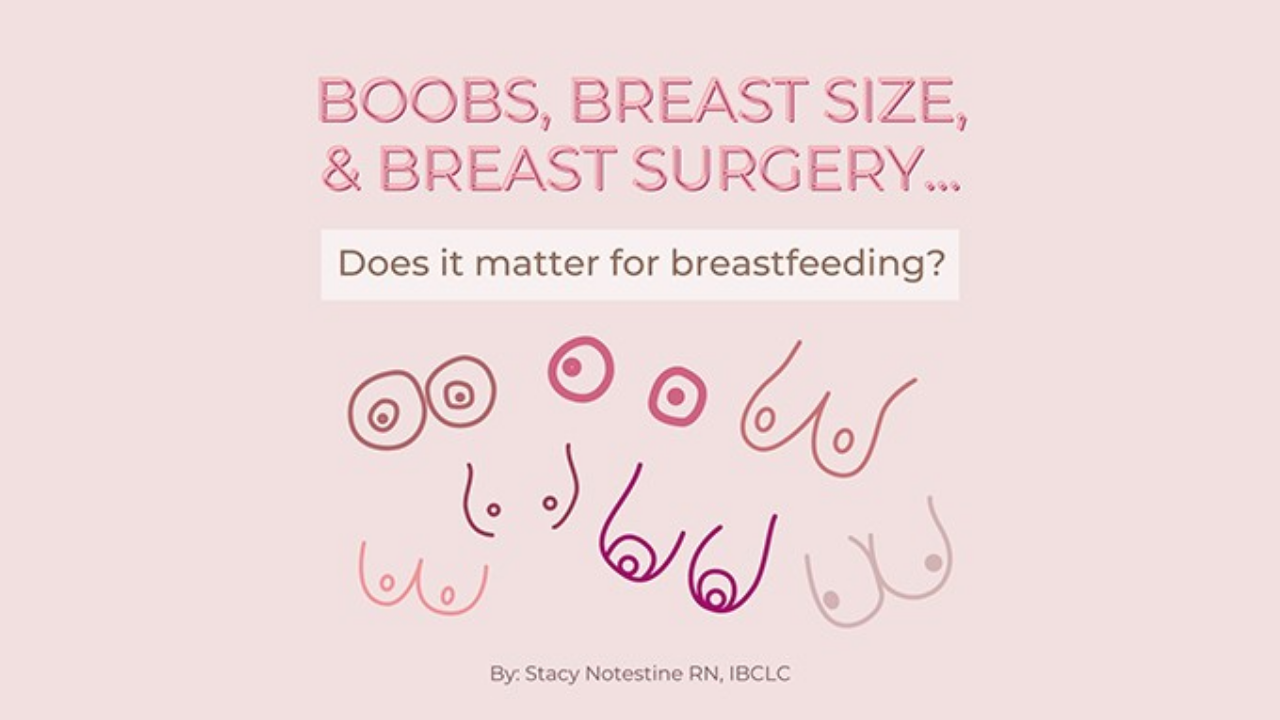Boobs, Breast Size and Breast Surgery… Does it matter for Breastfeeding?
Jul 07, 2021
Have you looked at your beautiful breasts that are nourishing a little human lately? Here's the thing, breasts come in all different shapes and sizes! Some are large, some are small, most women have one breast that is a little bit bigger than the other (btw), some women have large flat nipples, some women have small pointed or inverted ones, some women augment their breasts, and some women pierce their nipples; but the overall point is, all types of breasts and nipples are BEAUTIFUL and UNIQUE!
With all of this in mind, I want to talk about a commonly asked question that many new moms ask me:
"Does the shape and size of my breasts and/or nipples affect my ability to breastfeed?"
Simply put, usually not. Smaller sized breasts generally do not affect your ability to produce milk or affect the amount of milk you are able to produce. During pregnancy, regardless of size, your breasts should get bigger. This is the body's natural way to prepare to breastfeed. The amount of milk a mother is able to produce is commonly based upon how often her baby feeds and how much milk her baby takes in with breastfeeding, and has nothing to do with natural breast size.
In my experience, I have seen plenty of moms who are barely an "A" cup make plenty of milk. The milk making glands inside the breasts are called alveoli. They are present in varying amounts in breast tissue. One surprising thing that you may not realize is that the actual size of the breast is determined mainly by the amount of fat in the breasts, not by the milk making tissue.
Latching
As far as size and the shape of a woman's nipples, size and shape can play a role in a baby's ability to latch especially if the baby is born prematurely, suck problems or mom has larger diameter nipples. I kindly call this "oral boobular disproportion." It simply means that baby has a small mouth and mom has larger nipples and the two don't fit together so well. Have no fear! There are many positioning and latching tips and tricks that can help that may be able to make the process easier. It is important to seek the help of a skilled lactation consultant if this is the case. As your baby grows, so does his/her mouth, which often makes it easier for them to latch. Check out the Baby's Best Beginning You Tube channel for latching tips.
What about some potential red flags if your breasts/nipples look abnormal?
With breast size, there is potential to have breastfeeding problems when there is a significant difference in breast size ( > 2 cup sizes) and if the nipples/areolas are not fully developed. If the breasts did not increase in size during pregnancy, this is a BIG red flag with milk production. Similarly, if the breasts have a wide space (measuring > two fists) between them, this can indicate a problem.
Do you have a history of breast surgery or breast injury?
Another common question that I get is about breast augmentation and the impact on breastfeeding. There are far less common issues with breast augmentation surgery than breast reduction surgery especially if the implants have been placed under the chest muscle. Breast augmentation most generally does not impact milk supply. Where I have seen problems occur is with engorgement. If the breasts are big, full and hard it may flatten out the nipple and make it difficult for the baby to latch. It is important to treat the engorgement. Head over to the Baby's Best Beginning You Tube channel to learn more.
With breast reduction surgery breast tissue is removed so milk ducts and nerves were severed, which may inhibit the amount of milk that is able to be produced and flow. It is possible that over time, that some of the ducts can grow back together to find new pathways. I find that many moms with a history of breast reduction surgery make enough colostrum in the first few days, but thereafter milk volume is typically low. It is important to monitor that the baby is getting enough milk and supplementation may be necessary.
With any kind of breast surgery, be sure to talk to your surgeon ahead of time about your breastfeeding goals so that you both can come up with the best long-term plan, as well as talking to your healthcare provider and lactation consultant when you start breastfeeding.
Do you have pierced nipples?
In summary, all breasts and nipples, no matter the shape, size, or enhancement, are perfect and beautifully made, so the next time you look in the mirror, think to yourself: "I am strong, beautiful, and I love and appreciate my body for all that it does for me and my baby!"
No matter the obstacle, I am here to support you on your breastfeeding journey, and we will overcome any obstacle together!
Also, check out another one of my great resource for tips for successful breastfeeding here.
Milk on Mama!
YOU are your BABY'S BEST BEGINNING!
Wanna a FREEBIE?
Click HERE to Learn about the 5 Secrets to Getting Breastfeeding Off to a Great Start!
With love & gratitude,
Stacy
Let’s be (.)(.) Breast Pen Pals!
Stay connected with news and updates!
Get the latest news on upcoming classes and the latest blog posts.
We hate SPAM. We will never sell your information, for any reason.

